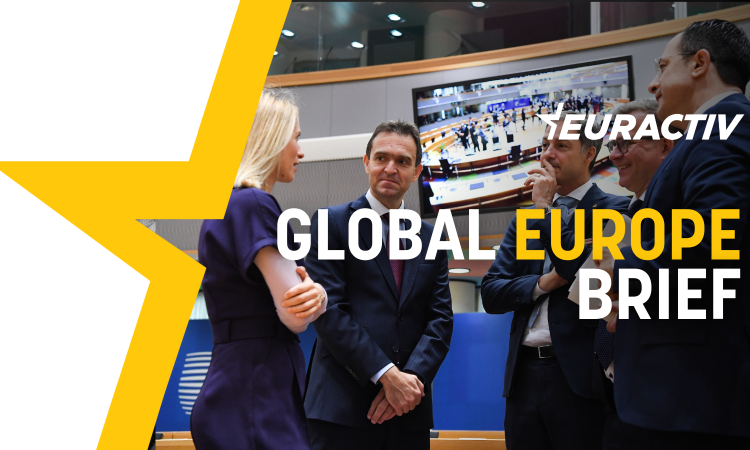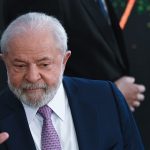
Welcome to EURACTIV’s Global Europe Brief, your weekly update on the EU from a global perspective.
You can subscribe to receive our newsletter here.
In this week’s edition: Turkey+ deal ideas, same-old NATO boss and enlargement brainstorming.
Russia was the ‘elephant in the room’ as EU leaders met to discuss the fallout of Wagner’s failed coup last weekend and debate what role the EU could play in long-term Western commitments to bolster Ukraine’s security.
Most EU leaders arriving in Brussels were largely cautious in interpreting the Wagner-related events, stressing the mutiny was an ‘internal Russian matter’ and the EU should double down on support for Ukraine regardless.
The day before the EU summit, Estonia’s Prime Minister Kaja Kallas was the most outspoken telling a packed room of reporters that “Russia is dangerous, has been dangerous and will be dangerous in the future”.
“Our goal should be to end the grey zones in Europe – they are the breeding grounds for instability and wars. It is the experience of my own country that NATO membership is the safest, cheapest, and most credible way of deterring Russia,” she said.
All three Baltic states, entering the European Council building, unanimously called for a clear perspective for the country’s accession to NATO.
It’s not enough to repeat the old formulas about the alliance’s open door policy, Lithuanian President Gitanas Nausėda told reporters. Latvian counterpart Krišjānis Kariņš was even more direct, saying that what the country needs is “full NATO membership when the war ends”.
However, it seems increasingly unlikely that such membership promises will be made at NATO’s Vilnius summit in two weeks. Countries like the United States, Britain, France and Germany are expected to come up with possible security assurances for Ukraine.
But the pressure to walk the walk on future security pledges for Ukraine is building – the EU summit conclusions for the first time included a reference to future security commitments the bloc could give to Kyiv.
The passage was inserted into the text at the special request of France, which was not uncontroversial among some member states but largely accepted as the talk was about “commitments” and not of “guarantees”.
While it remains clear that the EU will provide long-term support to Ukraine, it also means huge financial efforts.
Although there is still some sensitivity around frozen Russian funds, EU leaders seemed open to looking into how to use this money to help rebuild Ukraine.
The European Commission believes that this is the only way to free up more taxpayer money – and some EU leaders are increasingly warming to such steps, with the perspective that their national budgets might not be involved.
A total of €207 billion in Russian state assets were “immobilised”, according to an internal EU document shown to EURACTIV. The vast majority of this – €180 billion – is in Belgium, held by the payment processor Euroclear.
EU diplomats also say that about €100 billion of the Russian central bank assets are in cash, earning roughly 3%, and that is what would be subject to the tax.
Of course, even that is a drop in the ocean when compared to the likely actual cost of reconstruction, but it could be a start.
A Swedish-led Council working group has been examining two options in recent months.
On the one hand, Russian deposits could be invested actively and profitably – then one could pocket the profits above the minimum interest rate. The EU, though, would then also have to answer for possible losses.
More than half of the member states, led by Germany, and the legal services of the Council and Commission take a somewhat more sober view, protective of the principle of “state immunity” – that is, states are not allowed to sit in judgment on one another.
On this sensitive point, the EU’s summit conclusions contained only a commitment to continue working, coordinate with partners and comply with international law.
EU IN THE WORLD
SPANISH VISIT |Spanish Prime Minister Pedro Sanchez pledged the EU’s “unequivocal” support for Ukraine in Kyiv on Saturday (1 July) as Spain assumed the presidency of the bloc, while Ukrainian President Volodymyr Zelenskyy hit out at foot-dragging over pilot training by “some” Western nations.
TURKEY+?| A group of nine Mediterranean EU countries have urged the bloc to create a formal ‘southern partnership’ with African countries based on cooperation on energy and migration, according to a document seen by EURACTIV.
Nothing of that, or the EU’s plans for a future Tunisia deal, found its way into the EU’s summit conclusions because EU27 failed and failed again to resolve a dispute about the internal dimension of migration.
STALLING TALKS, AGAIN | Mercosur countries cancelled trade talks with the EU meant to be held in Buenos Aires this week in what was seen as an attempt by Brazil’s President Lula da Silva to buy time and present a counter-proposal to the bloc’s most recent demands.
DEFENCE CORNER
ONE MORE YEAR | NATO Secretary-General Jens Stoltenberg will remain in his position for one more year, NATO diplomats confirmed to EURACTIV earlier this week, as the alliance seeks stability and unity while trying to maintain support for Ukraine against Russia’s aggression.
“It is not safe to change the captain during a storm”, one senior NATO official told EURACTIV when asked about the upcoming decision. Member states seem also largely satisfied with the decision as none of the latest names circulated as potential successors could reach full support. With that, Europe’s overall top job race next year promises to become a bit more interesting.
BOOTS ON BALTIC GROUND | Germany will help prop up NATO’s eastern flank further by permanently stationing 4,000 additional soldiers in Lithuania, German Defence Minister Boris Pistorius announced earlier this week, reversing a previous policy.
EDIRPA DEAL | EU member states, the European Commission, and the European Parliament earlier this week agreed to create a €300 million fund to incentivise the bloc’s joint procurement of arms to replenish stockpiles and help Ukraine.
TAXONOMY THOUGHTS| Europe’s defence industries have called on EU institutions to clarify the sector’s status in line with the bloc’s sustainable finance legislation in order to open doors for more public and private investment.
REGULATORY WAIVERS | Ongoing negotiations on the EU’s plan to boost the bloc’s ammunition production show a push towards a European defence industrial policy, that focuses on regulatory waivers.
ENLARGEMENT LATEST
BRAINSTORMING BREAKFAST |A group of 10 EU leaders met informally on the sidelines of a summit in Brussels to ‘brainstorm’ what the bloc’s enlargement could mean for its future. Talks focused on “how to manage the process of enlargement” in parallel to consideration about future members, several EU diplomats, briefed on the talks, told EURACTIV.
NEXT STEPS | New early local elections in North Kosovo are the next step in defusing the crisis between Belgrade and Pristina, EU’s chief diplomat Josep Borrell said as the bloc welcomed the release of three kidnapped Kosovar policemen.
WHAT ELSE WE’RE READING
ON OUR RADAR
- Spain’s PM Sanchez hosts European Council President Michel for start of EU presidency
| Sunday, 2 July 2023 | Madrid, Spain - European Commission College visit for the start of Spanish EU presidency
| Monday, 3 July 2023 | Madrid, Spain - Launch of the International Centre for the Prosecution of the Crime of Aggression against Ukraine
| Monday, 3 July 2023 | The Hague, The Netherlands - Mercosur leaders’ summit
| Monday, 3 July 2023 | Puerto Iguazu, Argentina - Turkey and Sweden hold last-ditch NATO membership talks
| Thursday, 6 July 2023 | Brussels, Belgium







